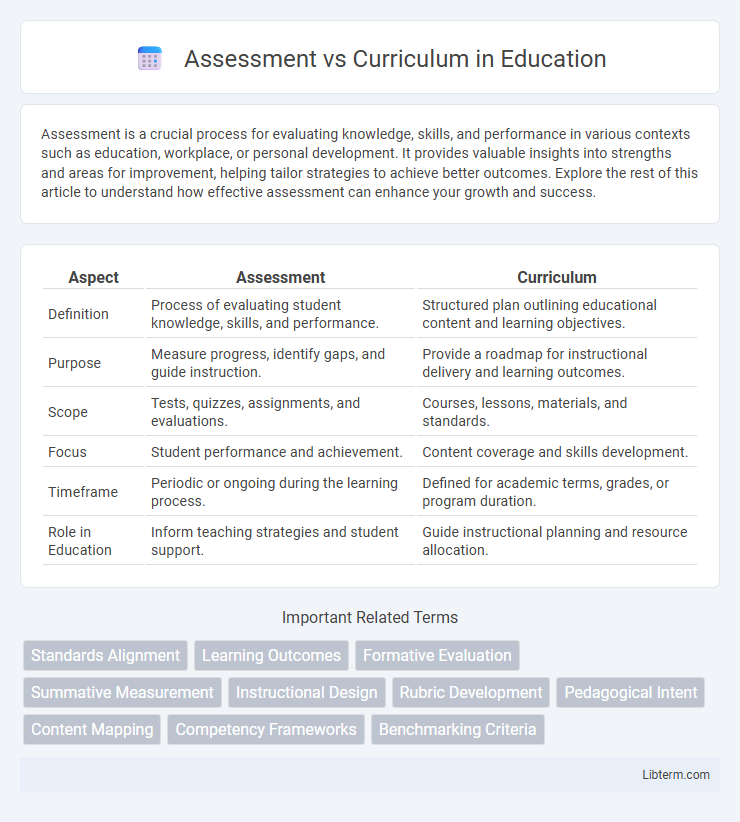Assessment is a crucial process for evaluating knowledge, skills, and performance in various contexts such as education, workplace, or personal development. It provides valuable insights into strengths and areas for improvement, helping tailor strategies to achieve better outcomes. Explore the rest of this article to understand how effective assessment can enhance your growth and success.
Table of Comparison
| Aspect | Assessment | Curriculum |
|---|---|---|
| Definition | Process of evaluating student knowledge, skills, and performance. | Structured plan outlining educational content and learning objectives. |
| Purpose | Measure progress, identify gaps, and guide instruction. | Provide a roadmap for instructional delivery and learning outcomes. |
| Scope | Tests, quizzes, assignments, and evaluations. | Courses, lessons, materials, and standards. |
| Focus | Student performance and achievement. | Content coverage and skills development. |
| Timeframe | Periodic or ongoing during the learning process. | Defined for academic terms, grades, or program duration. |
| Role in Education | Inform teaching strategies and student support. | Guide instructional planning and resource allocation. |
Introduction to Assessment and Curriculum
Assessment evaluates student learning, skills, and understanding through various methods like tests, quizzes, and assignments, guiding instruction and identifying areas for improvement. Curriculum defines the structured educational plan, detailing the content, objectives, and competencies to be taught within a specific timeframe. Both assessment and curriculum are integral to effective teaching, ensuring learning goals align with evaluation strategies for optimal student outcomes.
Defining Assessment in Education
Assessment in education refers to systematic methods used to evaluate, measure, and document students' learning progress, skills, and understanding. It involves various formats such as formative assessments, summative assessments, standardized tests, and performance tasks designed to inform instruction and improve student outcomes. Unlike curriculum, which is the structured content and learning experiences provided, assessment serves as an essential tool for measuring the effectiveness of the curriculum and guiding instructional decisions.
Understanding Curriculum Design
Assessment serves as a critical tool in understanding curriculum design by measuring how effectively learning objectives align with instructional content and student outcomes. Curriculum design integrates standards, learning goals, and content sequencing to create a coherent educational framework that guides assessment methods. Analyzing assessment results helps educators refine curriculum structure, ensuring it meets diverse learner needs and promotes mastery-based education.
Key Differences Between Assessment and Curriculum
Assessment measures student learning outcomes, skills, and knowledge through tests, quizzes, and evaluations, providing feedback on academic performance. Curriculum encompasses the planned content, lessons, instructional materials, and educational objectives designed to guide teaching and learning processes. Key differences include assessment's role in evaluating effectiveness and identifying learning gaps, while curriculum focuses on delivering content and structuring educational experiences.
The Role of Assessment in Curriculum Development
Assessment plays a crucial role in curriculum development by providing data-driven insights into student learning outcomes, enabling educators to refine instructional strategies and content alignment. Formative and summative assessments inform curriculum designers about the effectiveness of teaching methods and the relevance of learning objectives, ensuring the curriculum meets educational standards and learner needs. This continuous feedback loop supports the adaptation of curriculum frameworks to foster improved academic performance and skill acquisition.
Types of Assessment in Educational Settings
Formative assessment, including quizzes and classroom discussions, provides ongoing feedback to enhance student learning, whereas summative assessment evaluates overall achievement through exams and final projects. Diagnostic assessment identifies students' prior knowledge and learning gaps at the beginning of a course to tailor instruction effectively. Performance-based assessment requires students to demonstrate skills through practical tasks, aligning closely with curriculum objectives and real-world applications.
Curriculum Frameworks and Their Impact on Learning
Curriculum frameworks provide structured guidelines that shape educational content and pedagogical approaches, ensuring alignment with learning objectives and standards. These frameworks influence assessment design by defining competencies and skills students must demonstrate, promoting consistency and coherence in evaluating learning outcomes. The integration of curriculum frameworks and assessments enhances instructional effectiveness and supports targeted student progress monitoring.
Aligning Assessment Strategies with Curriculum Goals
Aligning assessment strategies with curriculum goals ensures that evaluations accurately measure student mastery of intended learning outcomes. Effective alignment involves designing assessments that reflect curriculum content, skills, and standards, enabling targeted feedback and informed instructional adjustments. This alignment promotes consistency in educational objectives, supports student progress tracking, and enhances overall academic achievement.
Challenges in Balancing Assessment and Curriculum
Balancing assessment and curriculum presents challenges such as ensuring assessments accurately reflect curriculum objectives and fostering deep learning rather than rote memorization. Teachers often struggle to align standardized testing with diverse curriculum goals, leading to potential gaps in skill development and knowledge retention. Maintaining flexibility in curriculum design is essential for accommodating varied assessment formats while meeting educational standards.
Future Trends in Assessment and Curriculum Integration
Future trends in assessment and curriculum integration emphasize adaptive learning technologies and real-time data analytics to personalize student evaluation and instructional content. Artificial intelligence-driven assessments enable continuous feedback loops, aligning curriculum adjustments with individual learner needs and promoting competency-based education models. Emerging frameworks prioritize interdisciplinary skills and digital literacy, fostering dynamic curriculum designs that evolve in tandem with assessment insights.
Assessment Infographic

 libterm.com
libterm.com